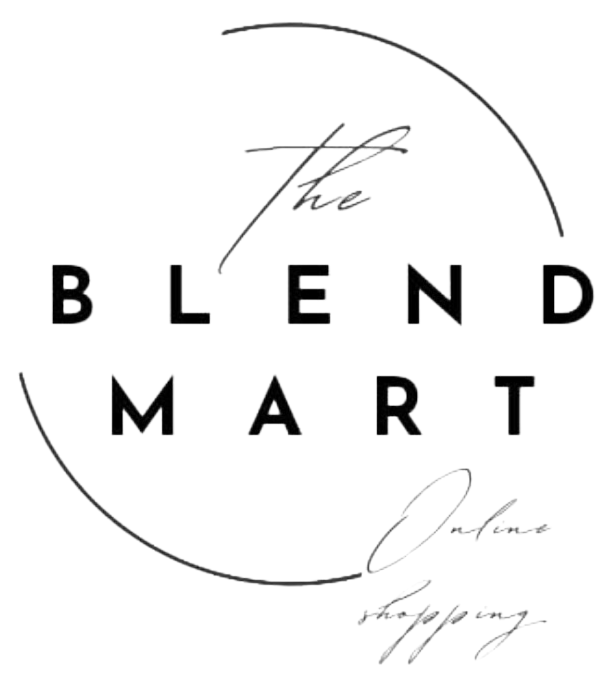Have you ever wondered why cabbage is called a nutrient powerhouse? This leafy green is often overlooked. But, it’s packed with vitamins, minerals, and antioxidants. It’s a great addition to any meal.
Adding cabbage to your diet can boost your heart health, immune system, and digestive health. It’s also very affordable. Let’s explore how cabbage can improve your well-being.
Key Takeaways
- Cabbage contains only 18 calories per cup, making it excellent for weight management.
- It is rich in vitamins C and K, contributing significantly to your daily intake.
- This cruciferous vegetable provides dietary fiber that supports digestive health.
- Cabbage contains antioxidants that may help reduce inflammation and lower cancer risk.
- Incorporating cabbage into your diet can positively impact cholesterol levels.
Introduction to Cabbage
Cabbage belongs to the Brassica family, which also includes kale and broccolini. It has been grown for thousands of years, mainly in Europe. You can find cabbage in many shapes and colors, like green, red, purple, and Savoy.
Its uses are vast, from soups and salads to fermented dishes. The cabbage health facts show its many benefits. This makes it a key part of many diets because it’s affordable and easy to find.
Is cabbage a healthy vegetable? Yes, it is. It has just 22 calories per cup. A half cup of cooked cabbage gives you about 30-35 percent of your daily vitamin C and 81.5 micrograms of vitamin K.
The fiber in cabbage helps with digestion and keeps your bowels regular. In short, the introduction to cabbage shows why it’s great for your health.
What Makes Cabbage a Nutrient Powerhouse
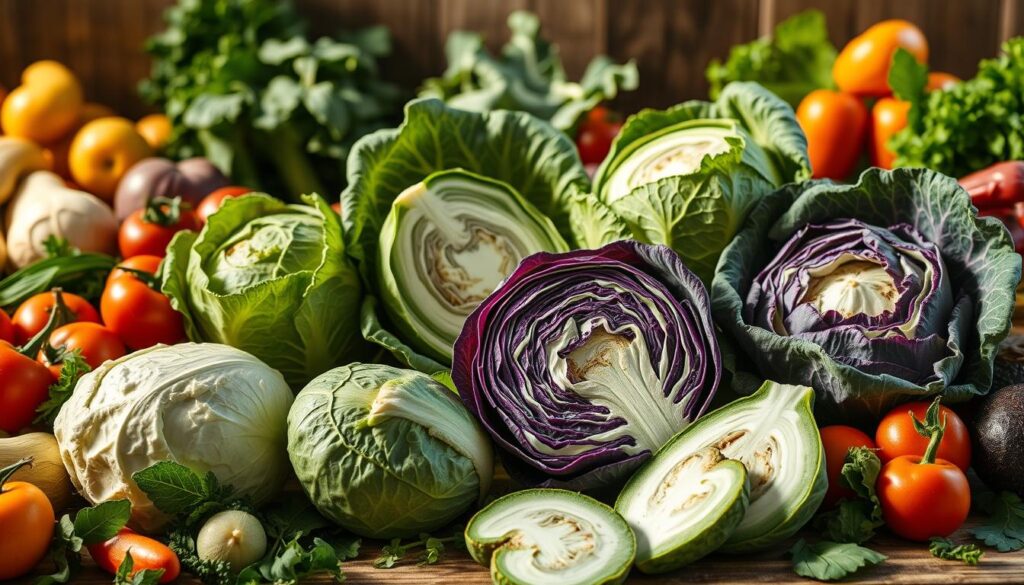
Cabbage is a top pick in the vegetable world for its rich nutritional value. It’s packed with nutrients that are key for staying healthy. Knowing what’s in cabbage helps us see its value and why it’s good for us.
Overview of Nutritional Value
Cabbage is full of vitamins like C and K, and folate. A cup of raw green cabbage has about 22 calories but is loaded with important nutrients. It’s also a good source of fiber, vitamin B6, manganese, and minerals.
Low-Calorie, High-Nutrient Content
Cabbage is low in calories but high in nutrients. It’s perfect for adding to meals without adding too many calories. This makes it great for those trying to lose weight or stay healthy. It’s filling and packed with nutrients, making it a key part of healthy diets.
Cabbage: A Nutrient-Rich Cruciferous Vegetable
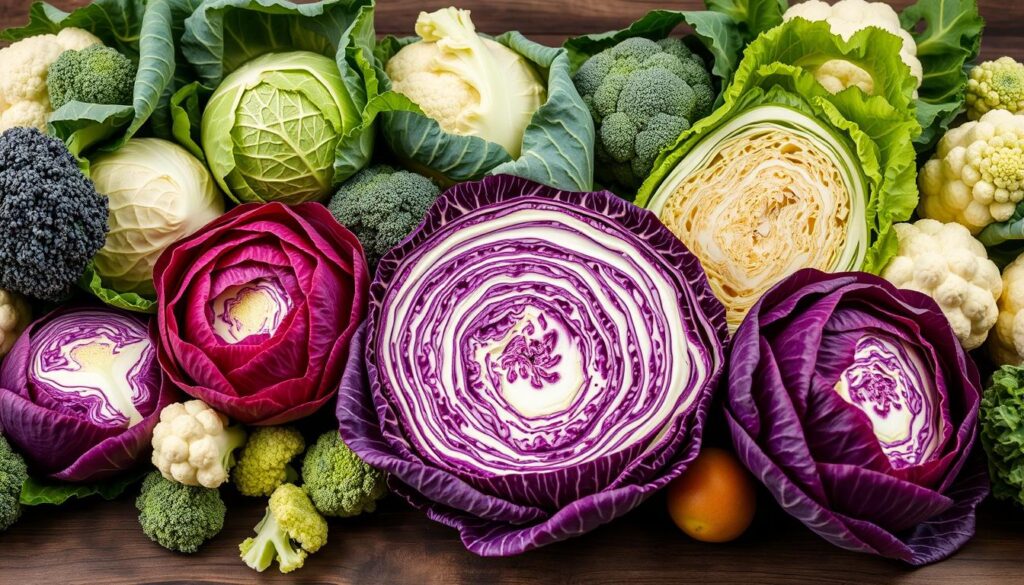
Cabbage is part of the cabbage family, known as Cruciferae or Brassica. This family also includes broccoli, Brussels sprouts, and kale. All these veggies are full of nutrients and phytochemicals that help keep us healthy.
Family of Cruciferous Vegetables
The cruciferous family is known for its health benefits. They contain compounds like indole-3-carbinol and sulforaphane. These might help fight cancer in organs like the bladder, breast, and colon.
Studies show that eating more of these veggies can be good for women. Women who eat over five servings a week might have a lower risk of lung cancer.
Diverse Varieties of Cabbage
There are many types of cabbage to choose from:
- Green cabbage
- Red cabbage
- Savoy cabbage
- Napa cabbage
- Bok Choy
Red cabbage is special because it’s full of antioxidants. It can help lower heart disease risk. Savoy cabbage has curly leaves that add a unique touch to dishes. These veggies are great for adding flavor and nutrition to your meals.
Rich in Vitamins and Minerals
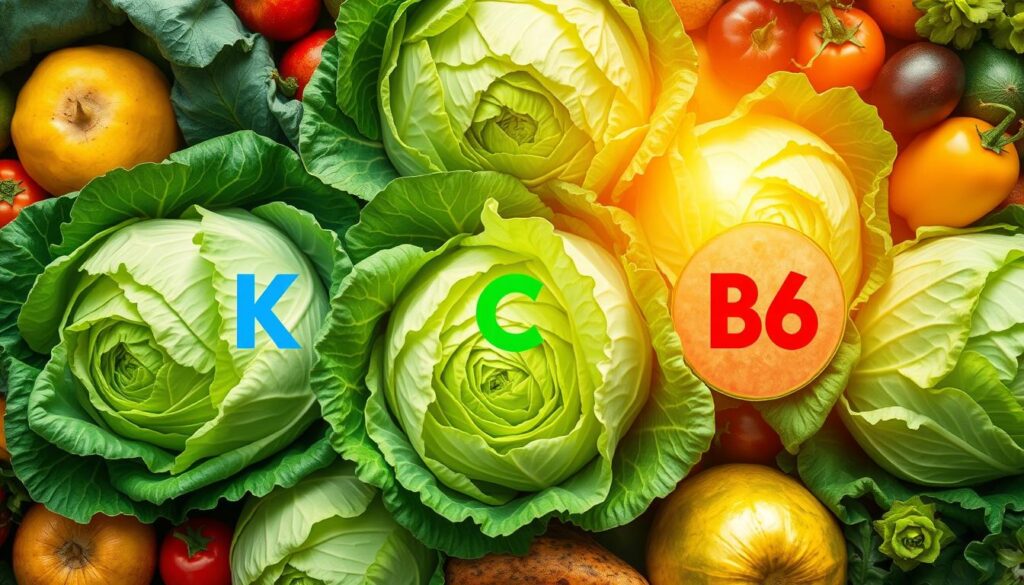
Cabbage is packed with important vitamins and minerals. It’s a great choice for your diet. Knowing the key vitamins in cabbage shows its health benefits.
Key Vitamins in Cabbage
Vitamin C and vitamin K are key in cabbage. One cup of raw red cabbage has about 50 mg of vitamin C. This helps meet the daily need of 75 to 90 mg.
Vitamin C is vital for making collagen, boosting the immune system, and fighting off free radicals. Vitamin K helps with blood clotting and supports bone health. Cabbage is a good source of vitamin K, helping you meet your daily needs.
Mineral Content and Its Benefits
Cabbage also has important minerals like potassium, manganese, calcium, and magnesium. Potassium is good for the heart, keeping blood pressure in check. Manganese helps with bone health and metabolism.
Calcium and magnesium are important for the body’s functions. Together, these minerals boost the nutritional benefits of minerals in cabbage. They support many bodily functions, keeping you healthy.
Antioxidant Powerhouse of Cabbage
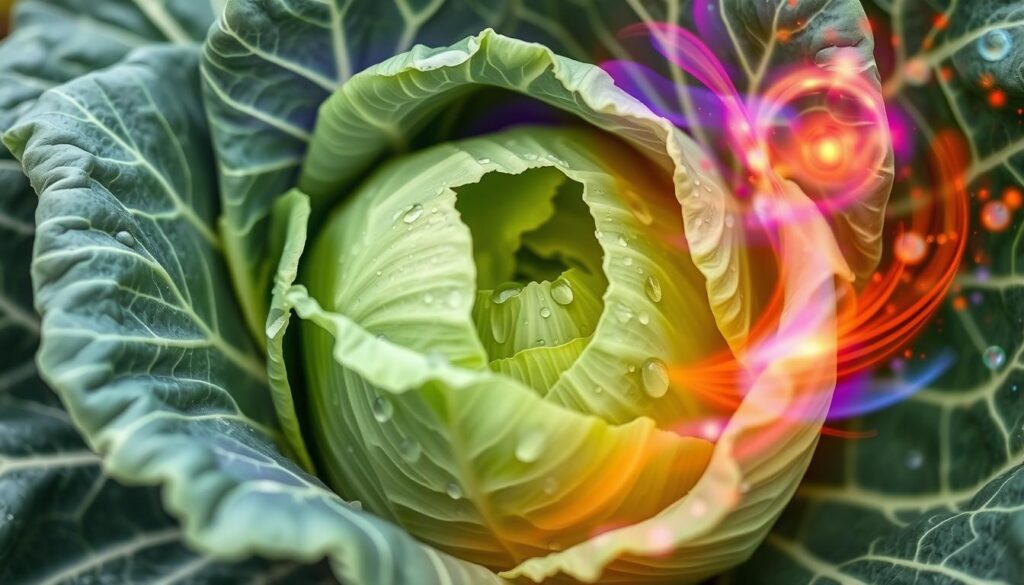
Cabbage is a top source of antioxidants that boost your health. It has vitamin C, sulforaphane, and polyphenols. These protect your cells from free radicals. Eating cabbage adds flavor and fights chronic diseases.
Types of Antioxidants in Cabbage
Knowing the types of antioxidants in cabbage shows its health benefits. These include:
- Vitamin C: It’s a strong antioxidant that boosts your immune system and skin health.
- Sulforaphane: This compound is known for its cancer-fighting properties.
- Polyphenols: They reduce inflammation and lower heart disease risk.
- Glucosinolates: They help prevent cancer and aid in detoxification.
Role of Antioxidants in Health
The health benefits of antioxidants in cabbage are clear. Eating it regularly can:
- Lower oxidative stress, linked to heart disease and diabetes.
- Lower cancer risk, with a 30% drop in breast cancer for cruciferous veg lovers.
- Boost overall health by reducing inflammation and improving detox, by 20-40%.
Supports Digestive Health
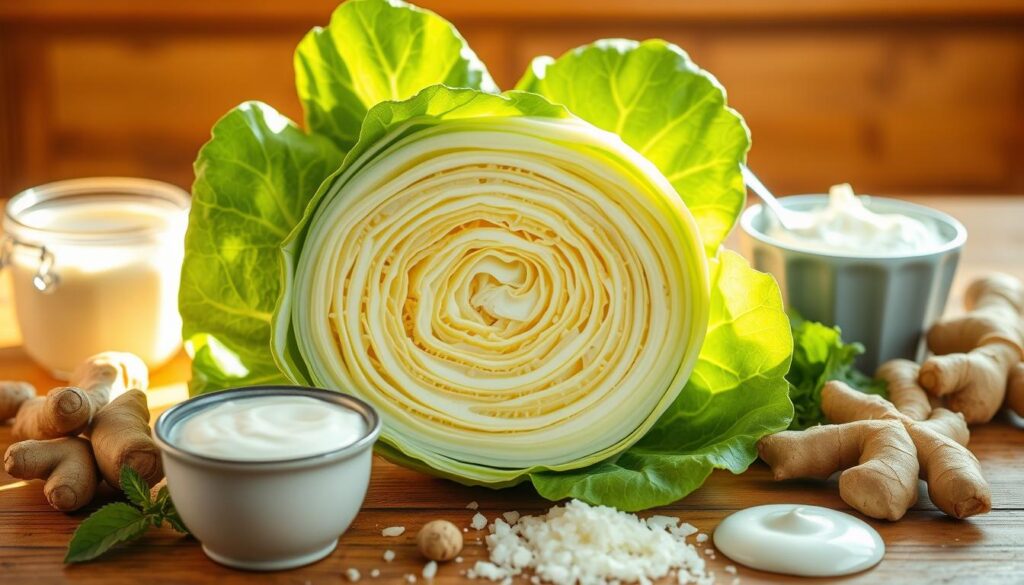
Eating cabbage can really help your digestive health. It’s full of fiber, which is great for digestion and keeping things regular. Each two cups of cabbage give you about 4 grams of fiber. This is a big part of the 21-38 grams adults should eat every day.
This fiber is key for a healthy gut. It helps prevent constipation and keeps your digestive system running smoothly.
Fiber Content and Digestive Benefits
Cabbage is also good for your gut health because of its fiber. It has about 1.8 grams of fiber per cup. This makes it a top choice for health.
Fiber does many good things for digestion. It helps you feel full and can help with weight management. It also feeds the good bacteria in your gut, called gut-friendly bacteria.
The Role of Gut-Friendly Bacteria
Gut-friendly bacteria are important for a healthy gut. They help break down food and absorb nutrients. They also keep bad bacteria away.
Cabbage feeds these good bacteria, making you healthier. Studies show a healthy gut microbiome boosts many body functions. Eating cabbage is a tasty way to support your digestive health and get important nutrients.
Gains in Heart Health
Eating cabbage can greatly improve your heart health. It’s full of vitamins and antioxidants that protect your heart. These nutrients, like anthocyanins, help lower blood pressure and bad cholesterol. This makes cabbage a great choice for your diet.
Cabbage is also low in calories but high in nutrients. A cup of raw green cabbage has only 22 calories. It also has 56% of the Daily Value for Vitamin K and 36% for Vitamin C. These vitamins help keep your blood flowing well and fight oxidative stress.
Cabbage is also good for your heart because of its fiber. It has about 2 grams of fiber per cup, with 40% being soluble. This fiber helps keep your cholesterol levels in check. Anthocyanins in cabbage also lower LDL cholesterol and blood pressure, which are key for heart health.
The following table highlights some of the nutritional benefits relevant to heart health:
| Nutrient | Amount per Cup (89g) | Heart Health Significance |
|---|---|---|
| Calories | 22 | Low-calorie food supports weight management |
| Vitamin K | 56% DV | Promotes healthy blood circulation |
| Vitamin C | 36% DV | Antioxidant that protects against heart disease |
| Fiber | 2g | Helps regulate cholesterol levels and lowers heart disease risk |
| Potassium | 9% DV | Helps maintain healthy blood pressure |
Studies show that eating cruciferous veggies like cabbage can lower heart disease risk. Adding cabbage to your meals can help make your heart healthier.
Potential Anti-Inflammatory Effects
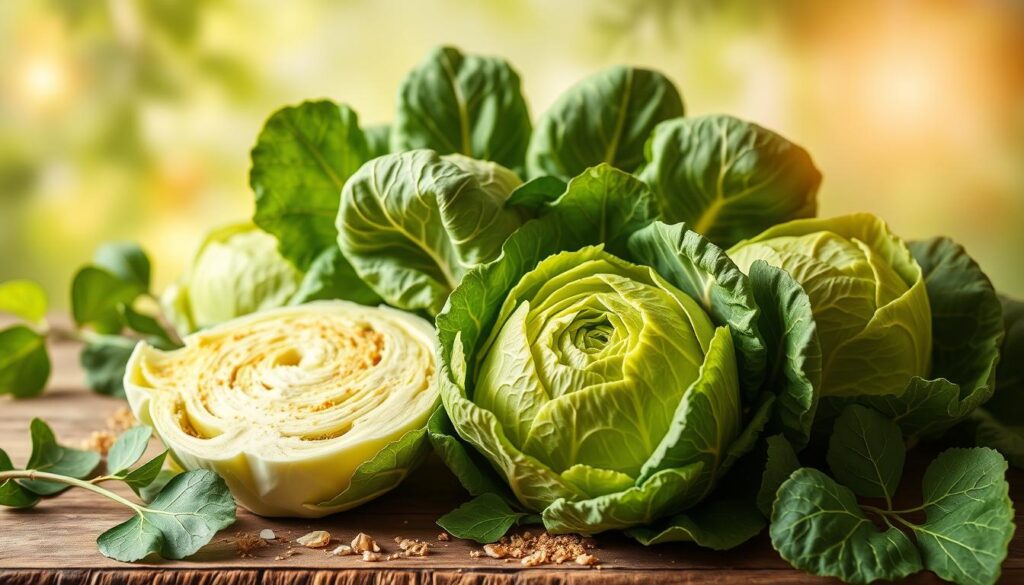
Chronic inflammation is linked to many health problems, like heart disease and diabetes. It’s important to know how food choices affect these issues. Eating foods with anti-inflammatory properties, like cabbage, can help reduce body inflammation.
Chronic Inflammation and Health Risks
Long-term inflammation can harm tissues and cause chronic diseases. Eating a diet rich in vegetables, like cabbage, can help fight this. Cabbage is great for lowering inflammation in the body. It can also reduce the levels of harmful cytokines.
Scientific Studies Supporting Inflammation Reduction
Studies have shown that eating more cruciferous vegetables, like cabbage, can lower inflammation. For example, a study in China found:
| Inflammatory Marker | Percentage Decrease | P-Value |
|---|---|---|
| Tumor Necrosis Factor-α (TNF-α) | 12.66% | 0.01 |
| Interleukin-1β (IL-1β) | 18.18% | 0.02 |
| Interleukin-6 (IL-6) | 24.68% | 0.02 |
These results show that a diet full of vegetables like cabbage can help lower inflammation. As we learn more about cabbage’s anti-inflammatory effects, it’s clear that diet is key to managing chronic health issues.
Bone Health and Cabbage
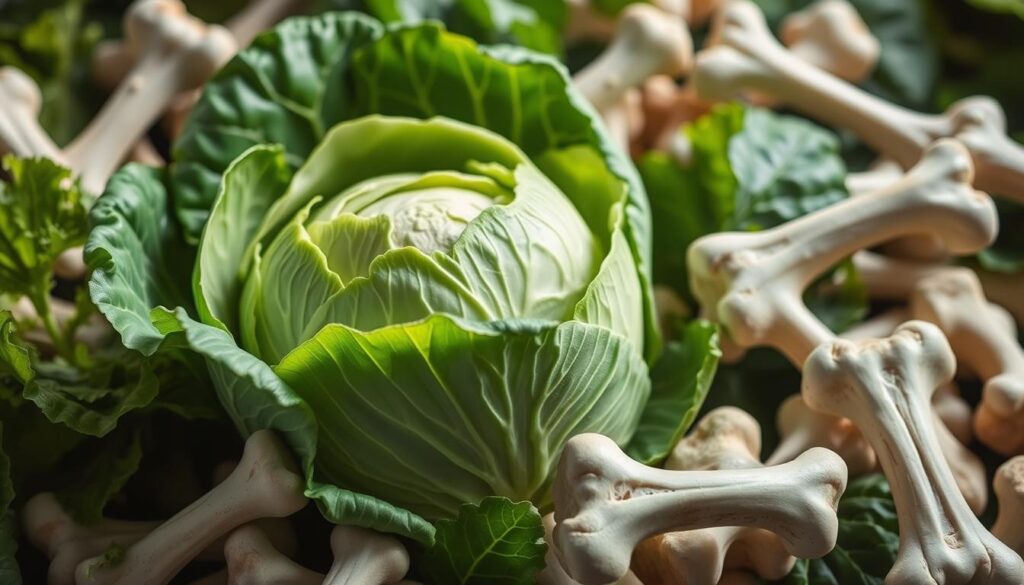
Cabbage is key for a diet that supports strong bones. It’s packed with vitamin K, giving you about 53 micrograms per cup of green cabbage. This covers 56% of what you need daily. Red cabbage has about 34 micrograms, which is 28% of your daily value.
Vitamin K is important for bone health. It helps your body absorb calcium and may lower the risk of osteoporosis.
Cabbage also has vitamins and minerals like vitamin C and folate. These help keep your bones dense. Plus, it’s low in calories, making it great for a healthy weight and strong bones.
Studies show that eating cabbage can boost bone health. Its fiber helps your gut, which is key for absorbing nutrients. Eating more cabbage and other cruciferous veggies can help keep your bones strong.
So, is cabbage good for bones? Absolutely! Its mix of vitamins and minerals makes it a top choice for bone health.
| Nutritional Component | Green Cabbage (1 cup) | Red Cabbage (1 cup) |
|---|---|---|
| Calories | 22 | 28 |
| Protein (grams) | 1 | 1.27 |
| Fat (grams) | Less than 1 | 0.1 |
| Carbohydrates (grams) | 5 | 6.56 |
| Fiber (grams) | 2 | 1.87 |
| Sugar (grams) | 3 | 3.41 |
| Vitamin K (micrograms) | 53.4 (85% DV) | 34 (28% DV) |
| Vitamin C (milligrams) | 32.6 (54% DV) | 50.7 (56% DV) |
| Folate (micrograms) | 38.27 (10% DV) | 16 (4% DV) |
Cooking and Preparation Tips for Cabbage
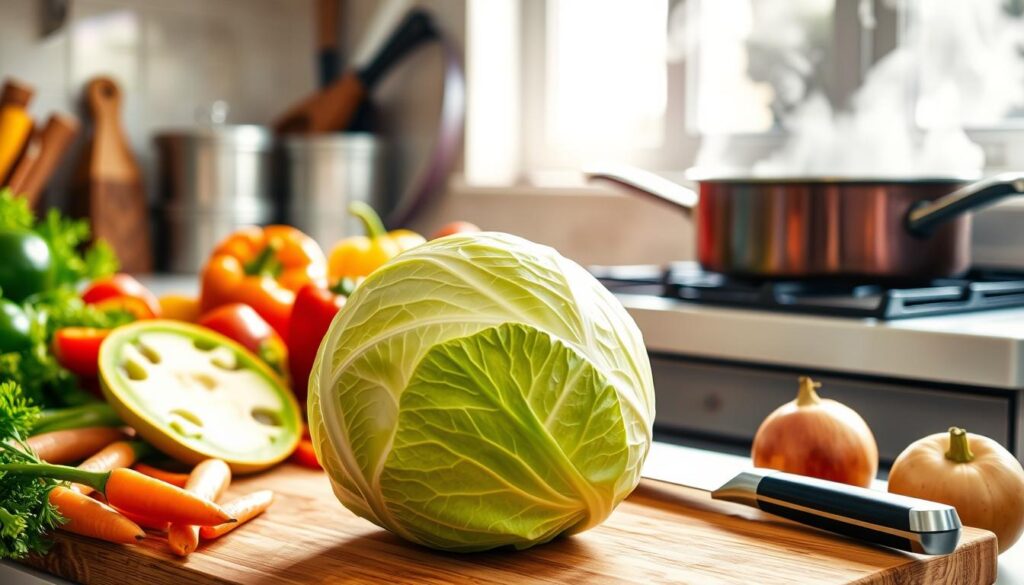
Cabbage is a versatile ingredient in many cuisines. It offers health benefits and delicious flavors. Knowing how to prepare cabbage can make it a staple in your diet. It’s important to understand the differences between raw and cooked cabbage, and to explore popular cabbage recipes.
Raw vs. Cooked Cabbage
The debate between raw and cooked cabbage is common. Raw cabbage keeps more nutrients, like vitamin C, which is lost in heat. Salads and coleslaws are great for a fresh taste.
Cooking cabbage, like steaming, makes it sweeter and easier to digest. It’s a great way to enjoy cabbage while keeping most of its nutrients.
Popular Cabbage Recipes
Adding cabbage to your meals is easy with these recipes:
- Sauerkraut: A fermented dish that boosts flavor and is good for digestion.
- Kimchi: A spicy Korean dish full of probiotics and flavor.
- Coleslaw: A crunchy salad that can be creamy or tangy.
- Cabbage Wraps: Great for low-carb meals, filled with nutritious ingredients.
- Soups and Stews: Cabbage adds flavor and nutrients to these dishes.
| Recipe | Calories per Serving | Carbohydrates | Fiber | Protein |
|---|---|---|---|---|
| Rainbow Coleslaw (½ cup) | 30 | 4 g | 1 g | 2 g |
| Steamed Green Cabbage (½ cup) | 9 | 2 g | 1 g | 1 g |
Adding these cabbage meals to your diet boosts nutrition. Try different cooking methods to find your favorites. This way, you can enjoy cabbage’s health benefits and culinary variety.
Possible Side Effects of Eating Cabbage

Cabbage is a nutritious addition to many diets. It has many health benefits. But, eating too much cabbage can cause side effects. Knowing these effects helps you enjoy cabbage without discomfort.
Gas and Bloating Concerns
Gastrointestinal issues like gas and bloating are common with cabbage. It has fiber and sugars that are hard to digest. This can be uncomfortable for some people.
If you’re sensitive to digestion, start with small amounts of cabbage. This can help your body adjust. It might reduce bloating.
For those with IBS, cabbage can make symptoms worse. Its high fructan content is a problem. If you experience constant gas or discomfort, cut back on cabbage.
Medication Interactions to Be Aware Of
Cabbage can interact with some medications, like anticoagulants. Its vitamin K can affect blood-thinning drugs like warfarin. It’s important to keep vitamin K intake steady if you’re on these medications.
Before adding cabbage to your diet, talk to a healthcare professional. They can help ensure your health is not compromised.
Knowing about cabbage side effects and its interactions with medications helps you make smart choices. This way, you can enjoy cabbage in your diet safely.
| Side Effect | Description |
|---|---|
| Gas from cabbage | Caused by high fiber and certain sugars leading to discomfort. |
| Bloating | Often occurs in sensitive individuals or those with IBS. |
| Cabbage drug interactions | High vitamin K content may interfere with blood thinners. |
| Precautions for cabbage consumption | Introduce gradually to reduce gastrointestinal discomfort. |
Is Cabbage a Healthy Food Choice?
Cabbage is seen as a nutritious food that’s easy on the wallet. It adds a lot to your diet without adding many calories. When you ask, Is cabbage a healthy food, its nutrient profile is key. It’s packed with health benefits and is very affordable.
Comparison with Other Vegetables
Cabbage is unique among vegetables. It has about 17.5 calories per cup, making it a top choice for those watching their calories. It also has important nutrients like vitamin K, which is good for your bones.
Men and women have different needs for vitamin K. One cup of cabbage gives you about 53 micrograms. Here’s a table comparing cabbage with other cruciferous vegetables:
| Vegetable | Calories per Cup | Fiber (grams) | Vitamin K (mcg) |
|---|---|---|---|
| Cabbage | 17.5 | 1.8 | 53 |
| Broccoli | 55 | 2.4 | 101 |
| Kale | 33 | 1.3 | 547 |
| Brussels Sprouts | 38 | 3.3 | 156 |
| Cauliflower | 22 | 2.0 | 15 |
Eating cabbage can help lower health risks. Studies show that eating more cruciferous veggies can be beneficial. For example, older women who ate more cabbage had a 46% lower risk of a certain health issue.
Cost-Effectiveness of Cabbage
Cabbage is not only healthy but also affordable. It’s available all year and is often cheap. This makes it a great choice for a healthy diet without spending a lot.
Adding cabbage to your meals can improve your nutrition. It’s great in salads or cooked in many dishes. It’s a smart way to make your diet healthier.
Conclusion
Cabbage is a great addition to your diet, packed with health benefits. It’s full of vitamins, minerals, and antioxidants. These help with digestion, heart health, and can even reduce inflammation.
Its high fiber content is key in lowering the risk of colorectal cancer. This is important, given the high cancer rates today.
Adding cabbage to your meals is a smart health move. It’s good for you and can be used in many dishes. Whether raw in salads or cooked, it boosts your nutrition without costing much.
In short, cabbage is a must-have on your plate. It’s a powerful food for those aiming to eat healthier.
So, give cabbage a try and enjoy its many health benefits. It’s a great choice for anyone looking to improve their diet.
